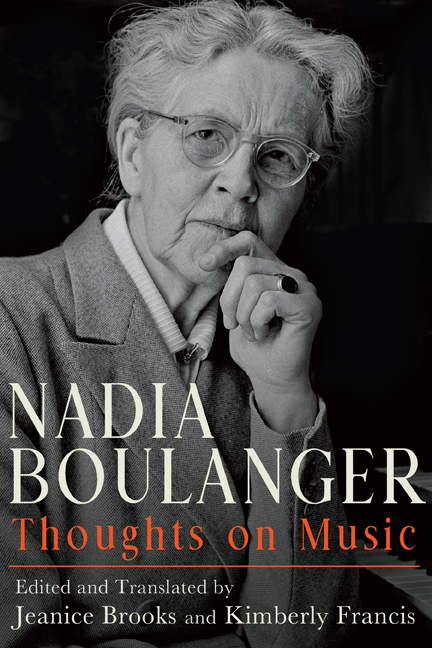Book contents
- Frontmatter
- Contents
- List of Illustrations
- Acknowledgments
- Editorial Apparatus and Critical Notes
- Note on Translations
- List of Abbreviations
- Timeline of Nadia Boulanger’s Life
- Introduction
- Part One Journalism, Criticism, Tributes
- Part Two Lectures, Classes, Broadcasts
- Bibliography of Nadia Boulanger’s Published Writing
- General Bibliography
- Index
“Concerts Colonne,” Le Monde Musical 30, no. 12 (December 1919): 350-53 (complete text)
Published online by Cambridge University Press: 15 October 2020
- Frontmatter
- Contents
- List of Illustrations
- Acknowledgments
- Editorial Apparatus and Critical Notes
- Note on Translations
- List of Abbreviations
- Timeline of Nadia Boulanger’s Life
- Introduction
- Part One Journalism, Criticism, Tributes
- Part Two Lectures, Classes, Broadcasts
- Bibliography of Nadia Boulanger’s Published Writing
- General Bibliography
- Index
Summary
Concerts Reviewed
November 16, 1919
Fidelio oder Die eheliche Liebe, Overture ‘Leonore no. 3,’ C major, op. 72b, Ludwig van Beethoven
Symphony no. 7, A major, op. 92, Ludwig van Beethoven,
Les trois âmes, “L’âme du feu” and “L’âme des eaux,” Dynam-Victor Fumet
Pagine di guerra, op. 25 bis, Alfred Casella
Siegfried, WWV 86c, no. 25b, “Forest Murmurs” (Act II), Richard Wagner
Petrushka, Igor Stravinsky
November 23, 1919
Ramuntcho, “Overture,” “Le Jardin de Gracieuse,” “Le Concert d’Amesqueta,” and “Rhapsodie basque,” Gabriel Pierné
Rusalka, op. 114 (extract), Antonin Dvorak
“Slovakian song,” Karel Kovarovic
Le festin de l’araignée, op. 17 (extract) Albert Roussel
Symphonie fantastique, op. 14, Hector Berlioz
November 30, 1919
Parsifal, WWV 111, Act I, scene 2, Richard Wagner
Symphony no. 9, D minor, op. 125, Ludwig van Beethoven
December 6, 1919
Die Hebriden (“Fingalshohle”), op. 26, Felix Mendelssohn
Symphony no. 5, C minor, op. 67, Ludwig van Beethoven Danse macabre, op. 40, Camille Saint-Saëns
Etude symphonique, op. 45, Blair Fairchild
Impressions d’Italie, Gustave Charpentier
December 14, 1919
Oberon (J. 306), “Overture,” Carl Maria von Weber
Romeo and Juliet, Pyotr Il’yich Tchaikovsky
L’apprenti sorcier, Paul Dukas
Les Préludes, Franz Liszt
We speak most often of things we know poorly; we frequently argue over things that we do not know at all—and we neglect, in reality, what we believe we love. We do this through the kind of alarm we feel at bringing together mind and heart, thought and feeling, reasoning and intuition.
In the realm of art, and even more in the realm of artistic education, the error is profound, for both the denial of spontaneous abilities and the exclusion of cultivated abilities are unacceptable, and to nearly the same degree.
Feelings are rarely discussed in these pages, although a passionate love for music and the hope to spread it, and a respect for life, its sweetnesses and its sufferings, dictate them from the first to the last line. But, to express that, what words could possibly be adequate? I have read, I have heard some admirable ones—how could I dare to write others?
- Type
- Chapter
- Information
- Nadia BoulangerThoughts on Music, pp. 105 - 116Publisher: Boydell & BrewerPrint publication year: 2020



